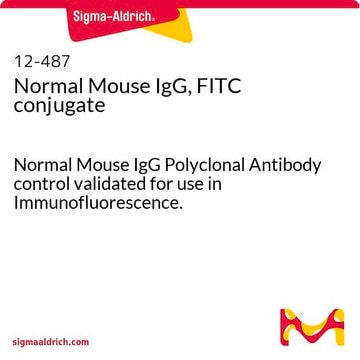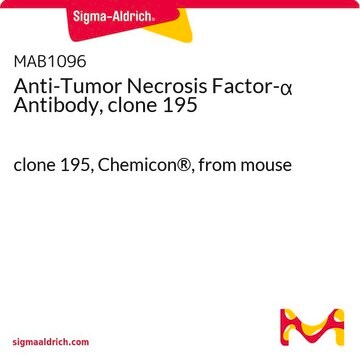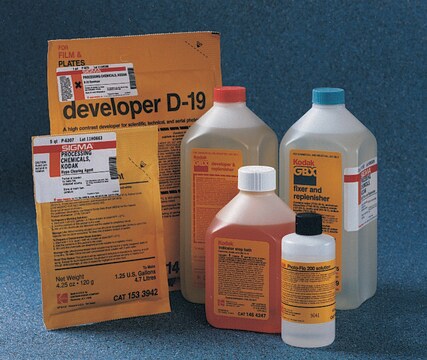MAB3061
Anti-Fas Antibody, clone SM1/1
clone SM1/1, Chemicon®, from mouse
Synonym(s):
CD95, Apo-1
Sign Into View Organizational & Contract Pricing
All Photos(1)
About This Item
UNSPSC Code:
12352203
eCl@ss:
32160702
NACRES:
NA.41
Recommended Products
biological source
mouse
Quality Level
antibody form
purified immunoglobulin
antibody product type
primary antibodies
clone
SM1/1, monoclonal
species reactivity
human
manufacturer/tradename
Chemicon®
technique(s)
flow cytometry: suitable
isotype
IgG2a
NCBI accession no.
UniProt accession no.
shipped in
wet ice
target post-translational modification
unmodified
Gene Information
human ... FAS(355)
Specificity
Specifically recognizes Fas [CD95/APO-1]
Application
Flow cytometry: 1-10 μg/mL, with incubation for 30 minutes at 4°C. Daudi or L929 cells may be used as negative controls.
Induction of apoptosis with SM1/1:
SM1/1 induces apoptosis best when used together with a 10 molar excess of crosslinking anti-mouse IgG. The amount of antibody needed will vary depending upon the cell line used and the age of the cell and their growing conditions; best results are achieved when cells are less than 70% confluent and relatively young passage numbers, and note not all cells what express CD95 can be induced with SM1/1, the reasons why are unclear.
On Jurkat cells 100-500ng/mL of SM1/1 in the presence of 10X excess of goat anti-mouse IgG will produce ~50% kill as measured by MTT assay; without crosslinking, little or no killing will be observed.
On SKw6.4 cells 100-500ng/mL of SM1/1 in the presence of 10X excess goat anti-mouse IgG will produce ~50% kill as measured by MTT; without crosslinking ~20% or less of the cells will be induced.
On L/F15 cells 100-500ng/mL of SM1/1 with or without crosslinking IgG ~ 50% of the cells will be induced to undergo apoptosis as measured by MTT assay.
In all cases it is important to remove excess SM1/1 before adding the secondary crosslinking antibody;
Antibody additions can be either at 4C, or 37C; at 37C primary antibody should be incubated no longer than two hours prior to secondary crosslinker addition. Crosslinking antibody is typically incubated overnight, although shorter times may yield acceptable results.
As controls, cells should be incubated with an unrelated irrelevant isotype matched IgG2a antibody or with the crosslinking antibody alone.
SM1/1 monoclonal characterization is first reported in Trauth, BC et al Science 1989 245:301-5.
Optimal working dilutions must be determined by end user.
Induction of apoptosis with SM1/1:
SM1/1 induces apoptosis best when used together with a 10 molar excess of crosslinking anti-mouse IgG. The amount of antibody needed will vary depending upon the cell line used and the age of the cell and their growing conditions; best results are achieved when cells are less than 70% confluent and relatively young passage numbers, and note not all cells what express CD95 can be induced with SM1/1, the reasons why are unclear.
On Jurkat cells 100-500ng/mL of SM1/1 in the presence of 10X excess of goat anti-mouse IgG will produce ~50% kill as measured by MTT assay; without crosslinking, little or no killing will be observed.
On SKw6.4 cells 100-500ng/mL of SM1/1 in the presence of 10X excess goat anti-mouse IgG will produce ~50% kill as measured by MTT; without crosslinking ~20% or less of the cells will be induced.
On L/F15 cells 100-500ng/mL of SM1/1 with or without crosslinking IgG ~ 50% of the cells will be induced to undergo apoptosis as measured by MTT assay.
In all cases it is important to remove excess SM1/1 before adding the secondary crosslinking antibody;
Antibody additions can be either at 4C, or 37C; at 37C primary antibody should be incubated no longer than two hours prior to secondary crosslinker addition. Crosslinking antibody is typically incubated overnight, although shorter times may yield acceptable results.
As controls, cells should be incubated with an unrelated irrelevant isotype matched IgG2a antibody or with the crosslinking antibody alone.
SM1/1 monoclonal characterization is first reported in Trauth, BC et al Science 1989 245:301-5.
Optimal working dilutions must be determined by end user.
Research Category
Apoptosis & Cancer
Apoptosis & Cancer
Research Sub Category
Apoptosis - Additional
Apoptosis - Additional
This Anti-Fas Antibody, clone SM1/1 is validated for use in FC, FUNC for the detection of Fas.
Linkage
Replaces: CBL527B
Physical form
Format: Purified
Purified IgG provided in PBS, no preservatives.
Storage and Stability
Maintain at 2-8°C in undiluted aliquots. After opening, aliquot and freeze at -20°C. Avoid repeated freeze/thaw cycles.
Other Notes
Concentration: Please refer to the Certificate of Analysis for the lot-specific concentration.
Legal Information
CHEMICON is a registered trademark of Merck KGaA, Darmstadt, Germany
Disclaimer
Unless otherwise stated in our catalog or other company documentation accompanying the product(s), our products are intended for research use only and are not to be used for any other purpose, which includes but is not limited to, unauthorized commercial uses, in vitro diagnostic uses, ex vivo or in vivo therapeutic uses or any type of consumption or application to humans or animals.
Not finding the right product?
Try our Product Selector Tool.
Storage Class Code
12 - Non Combustible Liquids
WGK
WGK 2
Flash Point(F)
Not applicable
Flash Point(C)
Not applicable
Certificates of Analysis (COA)
Search for Certificates of Analysis (COA) by entering the products Lot/Batch Number. Lot and Batch Numbers can be found on a product’s label following the words ‘Lot’ or ‘Batch’.
Already Own This Product?
Find documentation for the products that you have recently purchased in the Document Library.
Our team of scientists has experience in all areas of research including Life Science, Material Science, Chemical Synthesis, Chromatography, Analytical and many others.
Contact Technical Service







